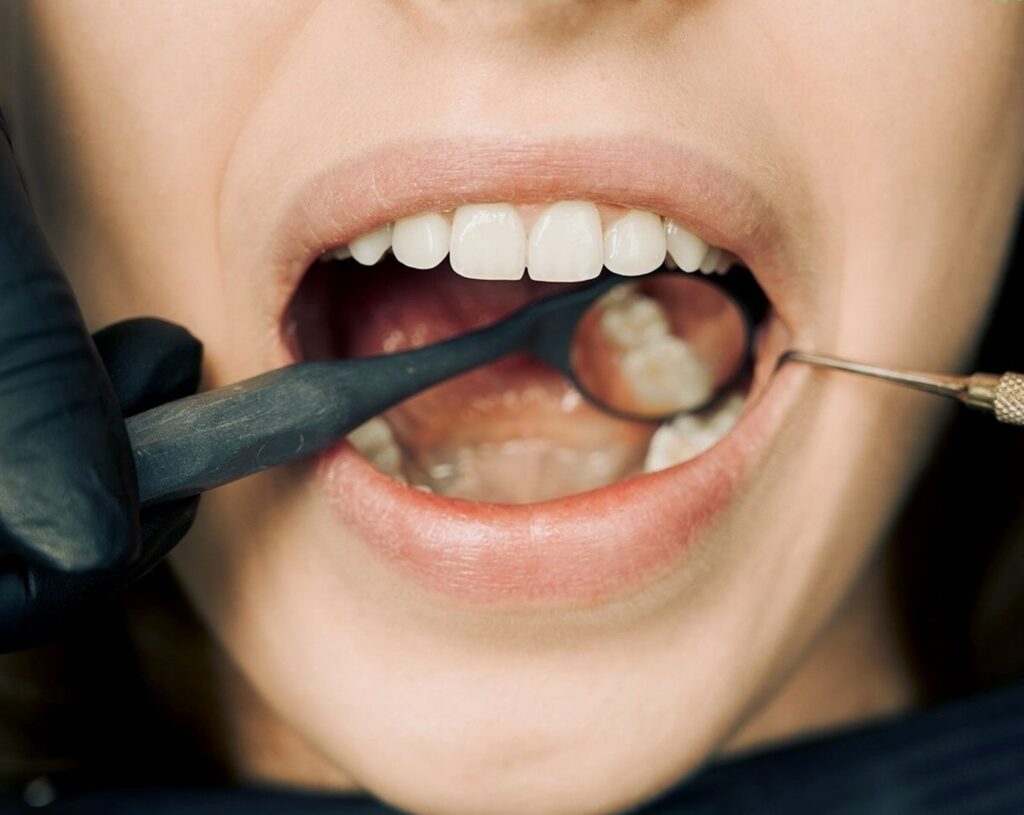Your smile is your calling card to the world, a radiant beacon that announces your presence. We want you to have a smile you’re proud of, one that brightens up rooms and lives. And this isn’t just about aesthetics – healthy teeth contribute to overall oral hygiene, which is fundamentally linked to general well-being.
This blog post will arm you with ten key tips to ensure your teeth remain healthy, strong, and dazzling for your entire lifetime. We’ll explore everything from brushing and flossing techniques to the types of food and drink that can help or harm your oral health.
So, pull up a chair, grab a glass of fluoridated water (great for your teeth!), and get ready to smile brighter than ever before.

Tip 1: Proper Oral Hygiene
Effective oral hygiene is the cornerstone of good dental health. Brushing twice a day and flossing once daily is the bare minimum recommended by dental professionals. Despite this, many individuals overlook these basic habits, leading to plaque build-up that can cause tooth decay and gum disease. When brushing, make sure you use fluoride toothpaste and spend at least two minutes ensuring every tooth is thoroughly cleaned.
Don’t forget about your tongue either! Bacteria can build up here too, leading to bad breath and other oral health problems. Cleaning your tongue can be as simple as using your toothbrush or investing in a tongue scraper.
Lastly, mouthwash can be a valuable addition to your oral hygiene routine. It can reach areas of the mouth that brushing and flossing may miss, offering an extra layer of protection against harmful bacteria.

Tip 2: Healthy Options for Good Oral hygiene
This is where the saying “you are what you eat” rings true. A diet high in sugars and acids can damage your teeth, causing decay and enamel erosion. Instead, focus on consuming a balanced diet rich in vitamins, minerals, and fiber to ensure the health of your teeth and gums.
Calcium-rich foods are particularly good for your teeth, as they help maintain strong enamel. Foods like milk, cheese, and yogurt provide a good source of calcium.
Foods high in fiber, such as fruits and vegetables, can help stimulate saliva production, which serves as a natural defense against cavities. Always remember, what you eat impacts your oral health as much as how often you brush or floss.
Tip 3: Regular Dental Visits
A crucial part of maintaining dental health is through regular check-ups with your dentist. These visits should occur at least twice a year, more if you have specific dental issues that need to be monitored. Regular check-ups allow your dentist to detect any early signs of cavities, gum disease, or other oral health problems.
Your dental visits may include:
- Routine Cleaning: Your dentist or dental hygienist will remove plaque and tartar that have accumulated on your teeth, followed by a thorough polish to remove stains and smooth the tooth surface.
- Oral Examination: Your dentist will inspect your teeth, gums, and oral tissues for signs of disease or abnormalities.
- X-Rays: If necessary, X-rays will be taken to examine parts of your mouth that cannot be seen by the naked eye, such as the jawbone and the spaces between teeth.
Tip 4: Smoking and Tobacco Use
The Effects on Oral Hygiene
Tobacco use, either through smoking or chewing, is detrimental to oral health. It can stain your teeth a yellowish-brown color and produces a sticky brown residue called ‘tar’ that can stick to teeth and gums.
Increased Risk of Diseases
Long-term use of tobacco can lead to a variety of serious oral health problems, including gum disease, tooth loss, and even oral cancer.
Consider Quitting
Quitting tobacco use can dramatically improve your oral health and reduce your risk of developing these conditions. Reach out to your healthcare provider for resources to help you quit.
Tip 5: Limiting Sugary Foods and Drinks
Sugar is the number one enemy of healthy teeth. It fuels the bacteria in your mouth, leading to acid production that can erode tooth enamel and cause cavities. Try to limit the consumption of sugary foods and drinks, especially between meals when your teeth are more susceptible to decay.
Key tips to follow include:
- Instead of sugary drinks like soda or fruit juice, opt for water or unsweetened tea.
- If you have a sweet tooth, try to satisfy it with fruits rather than candy or desserts.
- If you have to consume sugary foods, do so during meals when your saliva production is higher, which helps to neutralize harmful acids.
Conclusion
A dazzling smile that lasts a lifetime begins with proper oral hygiene and extends to lifestyle choices such as diet, regular dental visits, and abstaining from harmful habits like smoking. Remember, your oral health is in your hands, and every positive step you take contributes to a future filled with healthy smiles. Stay consistent, keep learning, and always remember the value of your oral health. Now, go flash that beautiful smile to the world!
If you are enjoying our informative blogs, please like and share with your friends and family. Also be sure to checkout our products and contact us for samples

